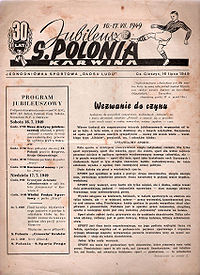
Polonia Karwina
Encyclopedia

Sport
A Sport is all forms of physical activity which, through casual or organised participation, aim to use, maintain or improve physical fitness and provide entertainment to participants. Sport may be competitive, where a winner or winners can be identified by objective means, and may require a degree...
club, located in the town of Karviná
Karviná
Karviná is a city in Moravian-Silesian Region of the Czech Republic, on the Olza River. It is administrative center of Karviná District. Karviná lies in the historical region of Cieszyn Silesia and is one of the most important coal mining centers in the Czech Republic. Together with neighboring...
(Karwina), Zaolzie
Zaolzie
Zaolzie is the Polish name for an area now in the Czech Republic which was disputed between interwar Poland and Czechoslovakia. The name means "lands beyond the Olza River"; it is also called Śląsk zaolziański, meaning "trans-Olza Silesia". Equivalent terms in other languages include Zaolší in...
, Czechoslovakia
Czechoslovakia
Czechoslovakia or Czecho-Slovakia was a sovereign state in Central Europe which existed from October 1918, when it declared its independence from the Austro-Hungarian Empire, until 1992...
. It affiliated nine sport clubs and an amateur theatre group. Most successful and most popular was a football club.
Founded in 1919, as Polski Klub Sportowy Polonia, it was the strongest team of the Polish minority in Czechoslovakia. PKS Polonia was initially one of the sections of Polish Gymnastic Society Sokół, eventually on 28 January 1931 it gained organizational independence. In 1932 it had 302 members, 65 of them in football section. In the 1920s and 1930s it played in the regional, Těšín
Ceský Tešín
Český Těšín is a town in the Karviná District, Moravian-Silesian Region of the Czech Republic. The town is commonly known in the region as just Těšín . It lies on the west bank of the Olza River, in the heart of the historical region of Cieszyn Silesia...
league (żupa) of the Czechoslovak Football Association. Together with such teams from Zaolzie
Zaolzie
Zaolzie is the Polish name for an area now in the Czech Republic which was disputed between interwar Poland and Czechoslovakia. The name means "lands beyond the Olza River"; it is also called Śląsk zaolziański, meaning "trans-Olza Silesia". Equivalent terms in other languages include Zaolší in...
as Siła Trzyniec, Siła Karwina, Siła Orłowa, Siła Frysztat, Siła Karwina-Sowiniec, Polonia in 1922 was co-founder of the Polski Związek Klubów Sportowych w Czechosłowacji (Polish Association of Sport Clubs in Czechoslovakia), which in mid-1930s had some 4,000 members.
Also, Polonia was very active on international stage, playing numerous friendly games with several teams from Poland. In 1934 it won the football competition of the first Polonia Games in Warsaw. It was a tournament for Polish ethnic sports organizations existing beyond borders of Poland, its official name was: "Games for Sportsmen from Abroad and The Independent City of Danzig". After the return of the team to Karwina, 10,000 Poles welcomed the winning team.
In 1936 came the largest success of the team in Czechoslovakia. PKS Polonia won the Těšín
Ceský Tešín
Český Těšín is a town in the Karviná District, Moravian-Silesian Region of the Czech Republic. The town is commonly known in the region as just Těšín . It lies on the west bank of the Olza River, in the heart of the historical region of Cieszyn Silesia...
league (župa) and advanced to the Moravian-Silesian Division, one of the highest leagues in the country.
In the fall of 1938 Polonia came to Warsaw, to face the renowned team of Polonia Warszawa
Polonia Warszawa
Polonia Warsaw is a Polish sports club with football and basketball teams, founded in 1911, and is the oldest such club in Warsaw, where it is based.- History :...
. This friendly match was connected with Polish takeover of Zaolzie and the Warsaw crowd enthusiastically welcomed players from Karwina.
In March 1939 Polonia was added to the Silesian A-Class (see: Lower Level Football Leagues in Interwar Poland
Lower Level Football Leagues in Interwar Poland
In interbellum Poland, there was not a national, Second Division, as we know it today . For example, on Sunday, September 26, 1937 in Częstochowa, a conference of A-Class teams took place, during which the possibility of creation of the Second League was discussed...
), however its results were not impressive. The 1939 season was not finished due to the outbreak of the World War II
World War II
World War II, or the Second World War , was a global conflict lasting from 1939 to 1945, involving most of the world's nations—including all of the great powers—eventually forming two opposing military alliances: the Allies and the Axis...
. During the war many club officials and supporters were murdered by Nazis.
In February 1948 communists in Czechoslovakia staged a coup d'état
Czechoslovak coup d'état of 1948
The Czechoslovak coup d'état of 1948 – in Communist historiography known as "Victorious February" – was an event late that February in which the Communist Party of Czechoslovakia, with Soviet backing, assumed undisputed control over the government of Czechoslovakia, ushering in over four decades...
. In 1949 the club was incorporated into Polish Sokół organization and renamed Sokół-Polonia. It was liquidated in 1952 by communists when the social, cultural and sport life were curbed into several organizations controlled by communists.

